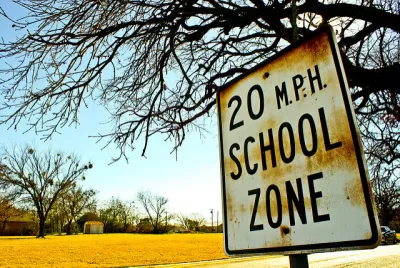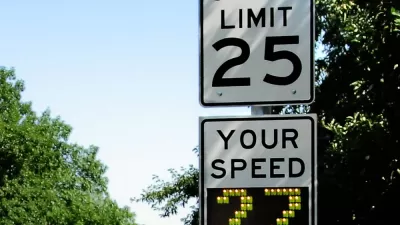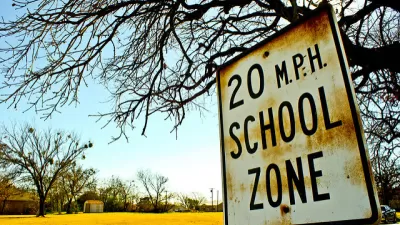All of Portland's 3,000 miles of residential streets now have a maximum speed of 20 miles per hour. Similar changes could be coming to more Oregon cities in the future.

"Crews installed the final 20 mile per hour speed zone sign on a neighborhood street in Southeast Portland on Tuesday, wrapping up a campaign to slow down cars and change the city’s driving culture dating back several years," reports Andre Theen.
"Last April, Portland formally lowered the speed limit by 5 miles per hour on all of its estimated 3,000 miles of residential streets," adds Theen to explain in more detail. "Crews removed 25 mile per hour signs citywide on those roads and installed more than 2,100 new signs across town in the past year."
The city of Portland is currently the only city in the state of Oregon with the legal power to lower its speed limit, thanks to state legislation approved in 2019. A bill currently under consideration at the state capital, Senate Bill 558, would give all Oregon cities that power, according to Theen.
As the rest of the state looks to Portland for lessons about the outcomes of the slower residential speeds, one large remaining question is the effectiveness of enforcement. The Portland Police Bureau is understaffed and speed enforcement is performed by triage. "Cops are focusing on high-crash corridors, those major streets like 122nd Avenue that see the greatest number of serious injuries or fatalities. Enforcing speed limits on neighborhood streets is 'a challenge,'" according to a bureau source cited by Theen.
FULL STORY: Portland wraps ‘20 is plenty’ effort, eyes more speed limit reductions

Maui's Vacation Rental Debate Turns Ugly
Verbal attacks, misinformation campaigns and fistfights plague a high-stakes debate to convert thousands of vacation rentals into long-term housing.

Planetizen Federal Action Tracker
A weekly monitor of how Trump’s orders and actions are impacting planners and planning in America.

San Francisco Suspends Traffic Calming Amidst Record Deaths
Citing “a challenging fiscal landscape,” the city will cease the program on the heels of 42 traffic deaths, including 24 pedestrians.

Adaptive Reuse Will Create Housing in a Suburban Texas Strip Mall
A developer is reimagining a strip mall property as a mixed-use complex with housing and retail.

Study: Anti-Homelessness Laws Don’t Work
Research shows that punitive measures that criminalized unhoused people don’t help reduce homelessness.

In U.S., Urban Gondolas Face Uphill Battle
Cities in Latin America and Europe have embraced aerial transitways — AKA gondolas — as sustainable, convenient urban transport, especially in tricky geographies. American cities have yet to catch up.
Urban Design for Planners 1: Software Tools
This six-course series explores essential urban design concepts using open source software and equips planners with the tools they need to participate fully in the urban design process.
Planning for Universal Design
Learn the tools for implementing Universal Design in planning regulations.
Heyer Gruel & Associates PA
JM Goldson LLC
Custer County Colorado
City of Camden Redevelopment Agency
City of Astoria
Transportation Research & Education Center (TREC) at Portland State University
Jefferson Parish Government
Camden Redevelopment Agency
City of Claremont




























